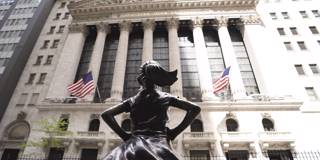By serving private capital markets rather than citizens and taxpayers, central banks constitute a major hurdle to meaningful climate action. A half-century after US President Richard Nixon and his advisers reshaped the international monetary system, we now need to transform it again.
LONDON – Fifty years ago, a US president closed the gold window, ended capital controls, and launched a new era of globalized finance. The “Nixon Shock” reshaped the international monetary system overnight, and then gradually changed the status of central bankers. Instead of acting as servants of the domestic economy, monetary policymakers have become masters of the globalized and financialized world economy. And this development bears directly on our ability to tackle the problems of climate change and biodiversity loss.
Despite their technocratic mystique, central bankers are politically appointed public servants on government payrolls, and still derive their authority from the taxpayers in their respective jurisdictions. As former Bank of England deputy governor Paul Tucker observes, “the right to create money is always latently a power of taxation.”
Central bankers’ status and constitutional role is therefore primarily a democratic question, not an economic or technical one. As the managers of public institutions that hold a monopoly over the issuance of currencies and liquidity, they wield awesome, powerful instruments that can be deployed only because they are backed by government treasuries.

LONDON – Fifty years ago, a US president closed the gold window, ended capital controls, and launched a new era of globalized finance. The “Nixon Shock” reshaped the international monetary system overnight, and then gradually changed the status of central bankers. Instead of acting as servants of the domestic economy, monetary policymakers have become masters of the globalized and financialized world economy. And this development bears directly on our ability to tackle the problems of climate change and biodiversity loss.
Despite their technocratic mystique, central bankers are politically appointed public servants on government payrolls, and still derive their authority from the taxpayers in their respective jurisdictions. As former Bank of England deputy governor Paul Tucker observes, “the right to create money is always latently a power of taxation.”
Central bankers’ status and constitutional role is therefore primarily a democratic question, not an economic or technical one. As the managers of public institutions that hold a monopoly over the issuance of currencies and liquidity, they wield awesome, powerful instruments that can be deployed only because they are backed by government treasuries.